Politics
Campaigned in armor
I think elections would be greatly improved if all politicians campaigned while wearing full suits of armor.
Fort Worth Star-Telegram - Feb 14, 1940
Posted By: Alex - Sat May 08, 2021 -
Comments (1)
Category: Politics, 1940s
Diplomacy Rap
The US Ambassador to Vietnam, Daniel Kritenbrink, recently released a rap video, in collaboration with Vietnamese rapper Wowy, to mark the Lunar New Year Holiday.While it may be rap, it also fits into the genre of cringe.
Kritenbrink's rap starts soon after the one-minute mark.
Posted By: Alex - Sat Feb 13, 2021 -
Comments (0)
Category: Ineptness, Crudity, Talentlessness, Kitsch, and Bad Art, Music, Politics
The Waffle Party
With all this talk of rogue Republicans forming a new party, I hope they choose a name as evocative as that of Canada's The Waffle.
Source.
Posted By: Paul - Fri Feb 12, 2021 -
Comments (1)
Category: Odd Names, Politics, 1960s, 1970s, North America
“The Great Society” Comic Book
Read the whole thing here.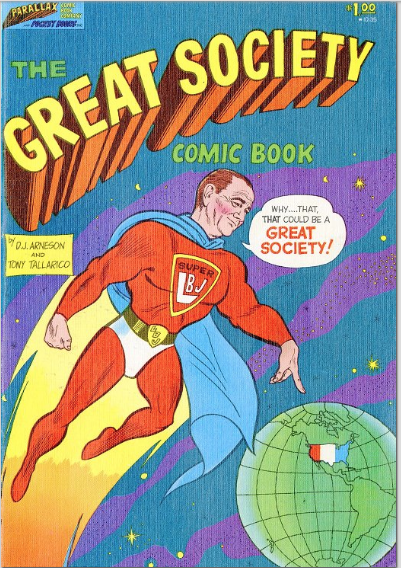
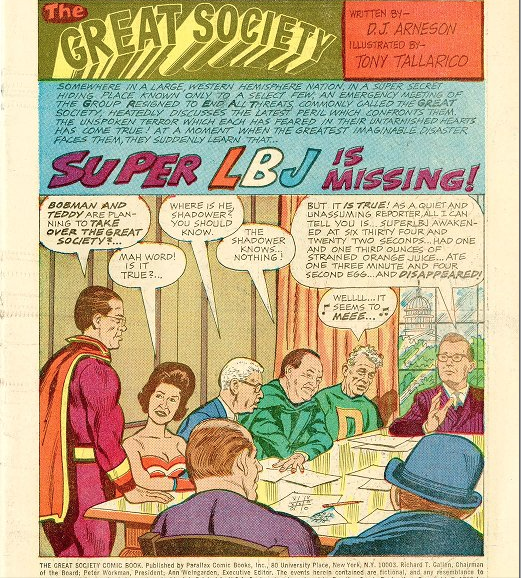
Posted By: Paul - Tue Feb 02, 2021 -
Comments (2)
Category: Humor, Parody, Politics, Comics, Superheroes, 1960s
Rodney Fertel’s Gorilla Campaign
1969: Rodney Fertel ran for mayor of New Orleans on what he called the "primate platform". He promised that, if elected, he would "Get a gorilla for the zoo." This was his primary campaign issue. He campaigned by standing on street corners, sometimes dressed in a safari outfit, sometimes in a gorilla suit, handing out miniature plastic gorillas to passers-by.
Rodney Fertel with a baby gorilla
Fertel lost the election, receiving only 310 votes, but he kept his promise by donating a pair of West African gorillas the following year to New Orleans' Audubon Zoo, at his own expense.
Incidentally, Rodney was the former husband of Ruth Fertel, who founded Ruth's Chris Steak House. Fertel's son has written a book about his parents titled The Gorilla Man and the Empress of Steak: A New Orleans Family Memoir.
More info: nola.com
Posted By: Alex - Tue Nov 03, 2020 -
Comments (3)
Category: Animals, Politics, Strange Candidates, 1960s
Landslide—the electoral college board game
Kenneth J. Gross and Sebron Koster were granted a patent in 1960 for Landslide, an electoral college board game. Players moved their pieces around the board trying to gain enough electoral college votes to start a 'landslide'. If you want to play it, the rules are below.As far as I can tell, their game was never sold in stores. However, there have been two other board games called Landslide that did make it to market (in 1971 and 2004). Both involved acquiring electoral college votes but were otherwise different than the 1960 version.
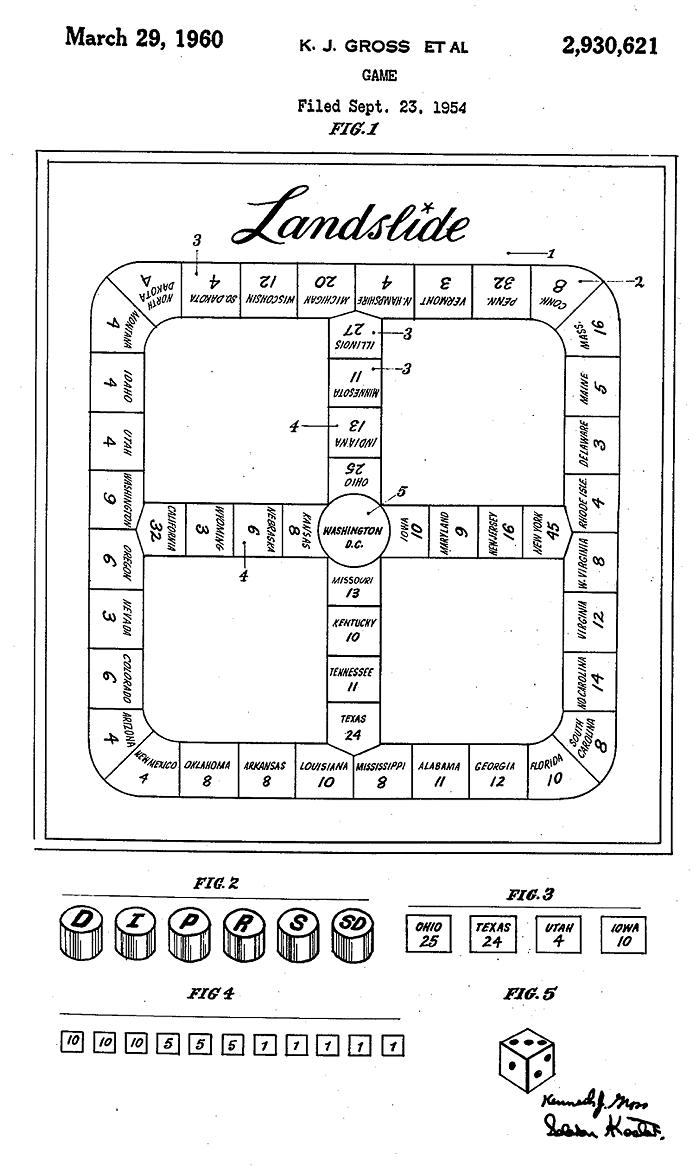
At the start of the play of a game each player selects his political party and takes his marker and tokens to match. Each player or candidate rolls the die and the candidate who rolls high die opens the play. He is succeeded in turn by each candidate in a clockwise direction. All candidates begin their campaign from the central segment, viz. Washington, D.C.
The number appearing on the die indicates the number of segments (States) which the candidate may move his marker and the number of electoral votes he wins in the State attained. He places his marker on that State and beside it his tokens corresponding to the number of votes thereby won in that State.
On each turn a candidate may move in any direction he chooses. The choice of routes allowed to candidates enables them to exert an influence on the development of their campaigns. In passing through a junction of three States he may traverse only two of the States in the course of any one move. He may not reverse his direction of movement in the course of one move. A candidate may not land on nor pass through a State occupied by another candidate's marker. If the movement of a candidate is blocked by the markers of other candidates in such a manner that he cannot move his marker to the full extent of his throw of the die, then he loses that turn. A candidate must move if possible.
A candidate must return to Washington, D.C. at any time that his throw of the die could place him there, providing that Washington, D.C. is unoccupied.
The number of electoral votes of a State won by a candidate is indicated by his tokens placed alongside that State. The entire electoral vote of a State is won by the first candidate to obtain a majority of the electoral votes of that State. When a State is won by a candidate he removes the card of that State and all the electoral vote tokens on that State are returned to their respective candidates.
States that have not been won are indicated by the presence of the State cards still beside them. Any candidate may land on a State that has been won by another candidate irrespective of the presence or absence of electoral votes remaining unacquired.
Whenever a candidate lands on Washington, D.C., he has the right to call a “caucus' if he so desires. When a caucus is declared all candidates count, the electoral votes of the States they have won completely, as indicated by the State cards in their possession. The outstanding electoral votes relating to States not yet won are also counted. Should the candidate with the least number of electoral votes be unable to win the election even by winning all the electoral votes of the States which are not yet won completely then he is eliminated as a presidential candidate. Only one candidate may be eliminated on each caucus.
If on the calling of a caucus, the tally of electoral votes indicates that every candidate still has a chance to win the election assuming his acquisition of all outstanding electoral votes, then the candidate calling the caucus loses all his electoral votes on States not won completely; that is he removes all his electoral vote tokens from the board.
The electoral vote tokens of the eliminated presidential candidate on the States not completely won are removed from the board. The electoral votes of the States completely won by the eliminated candidate are divided among the remaining candidates according to the geographical distribution set out in the table above. In other words the candidate with the most electoral votes from the Eastern States, takes all the Eastern States from the eliminated candidate and similarly for the other geographical groups of States.
The presidential election is won by the first candidate who captures 266 or more electoral votes.
Posted By: Alex - Sun Nov 01, 2020 -
Comments (1)
Category: Games, Politics, Patents, 1960s
I Go Pogo
Your election alternative.
Posted By: Paul - Thu Oct 29, 2020 -
Comments (0)
Category: Anthropomorphism, Humor, Satire, Politics, Comics, 1980s
Sing along with Khrushchov coloring book, an update
Eight months ago I posted about a coloring book published in 1962 titled The Sing Along with Khrushchov Coloring Book. I noted that, although I had come across references to the book in newspapers, I hadn't been able to find any images of it online. Nor were there any used copies for sale. And only two libraries in the U.S. had copies of it. It was really obscure!But I was just contacted by Elaine Woodward who revealed that her grandfather, who was on the American Hungarian Federation in DC, had once given her a copy, which she still had. She was kind enough to scan it and send it to me. So here it is, rescued from obscurity!
I've posted two sample images below. Or click here to read the whole thing (pdf file).
Note that the book spells Khrushchev with an 'o' rather than an 'e'... so the title was misspelled in my original post.

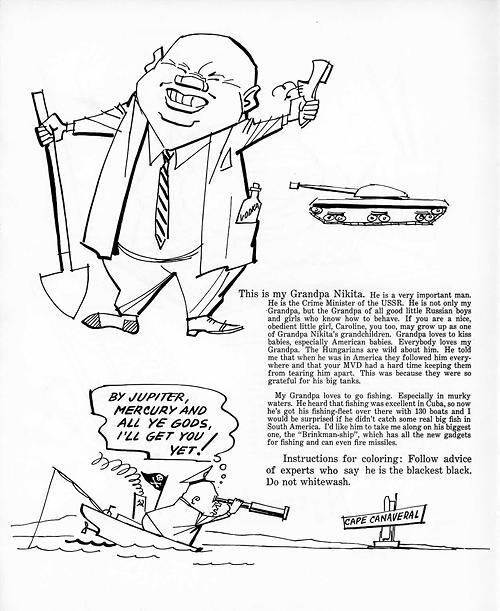
Posted By: Alex - Mon Oct 12, 2020 -
Comments (4)
Category: Art, Dictators, Tyrants and Other Harsh Rulers, Politics, Books, 1960s
Revolt of the Beavers
The more things change, the more they stay the same...Revolt of the Beavers was a children's play put on by the Federal Theater Project by Oscar Saul and Louis Lantz. One critic described the play as "Marxism a la Mother Goose".[1] The show ran at the Adelphi Theatre in New York City from May 20, 1937, to June 19 of that year.[2] Jules Dassin [3] and John Randolph [4] were among the play's cast. The play involved a worker beaver named Oakleaf, who leads a revolt against "The Chief" Beaver who was exploiting the workers. Though the play was a fantasy fable intended for children, it was attacked by the HUAC for promoting Communist ideals.
Wikipedia page (source of quote).
More photos here.
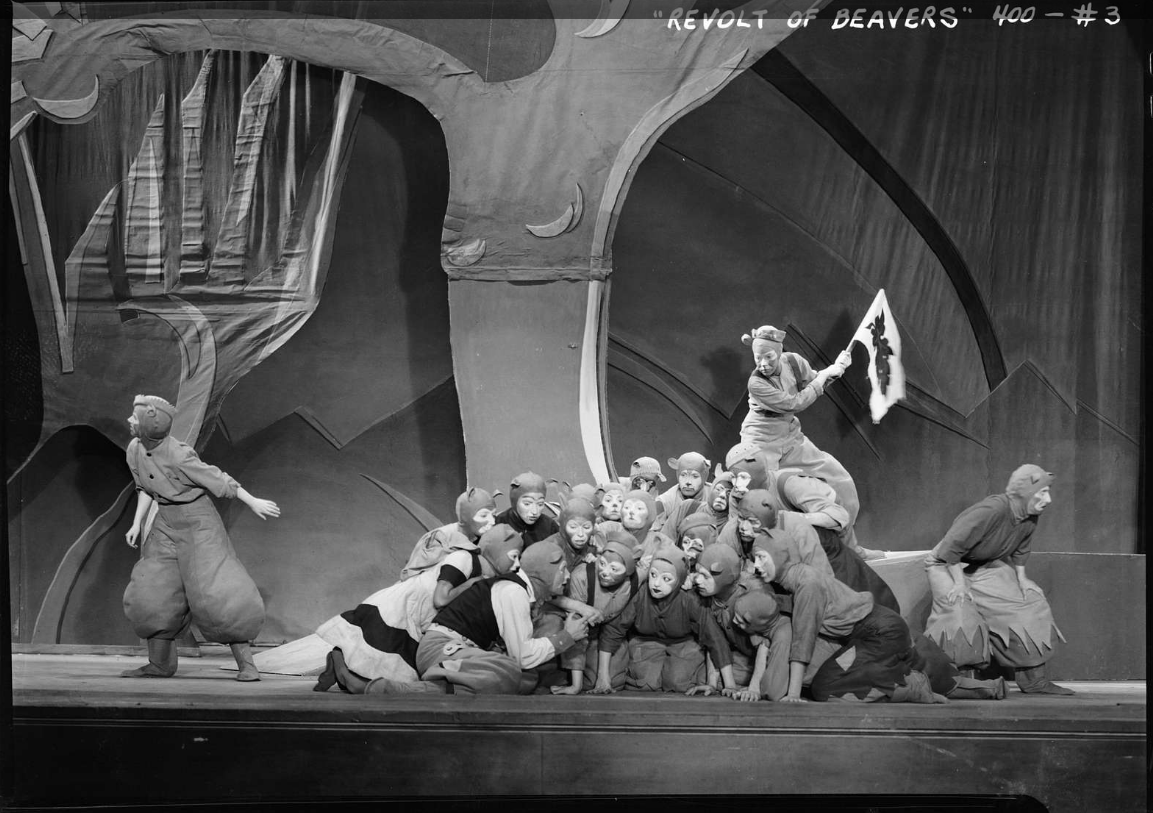
Posted By: Paul - Tue Sep 22, 2020 -
Comments (3)
Category: Animals, Anthropomorphism, Politics, Theater and Stage, 1930s
Partisan Boxers
Just in time for the 2020 election, from the legendary Frederick's Of Hollywood.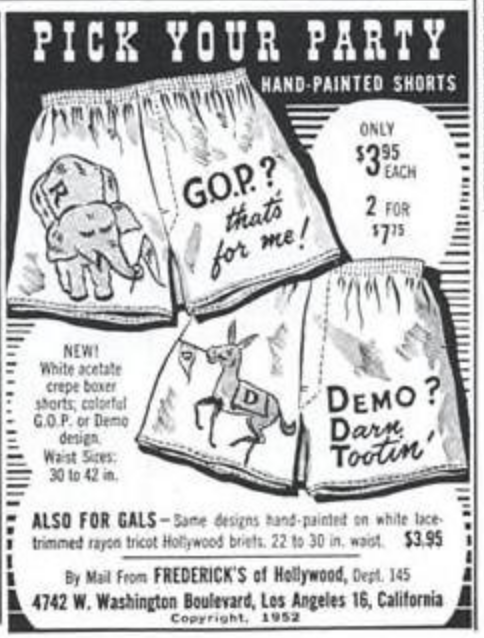
Ad source.
Posted By: Paul - Fri May 29, 2020 -
Comments (5)
Category: Animals, Politics, Underwear, 1950s

| Who We Are |
|---|
| Alex Boese Alex is the creator and curator of the Museum of Hoaxes. He's also the author of various weird, non-fiction, science-themed books such as Elephants on Acid and Psychedelic Apes. Paul Di Filippo Paul has been paid to put weird ideas into fictional form for over thirty years, in his career as a noted science fiction writer. He has recently begun blogging on many curious topics with three fellow writers at The Inferior 4+1. Contact Us |




